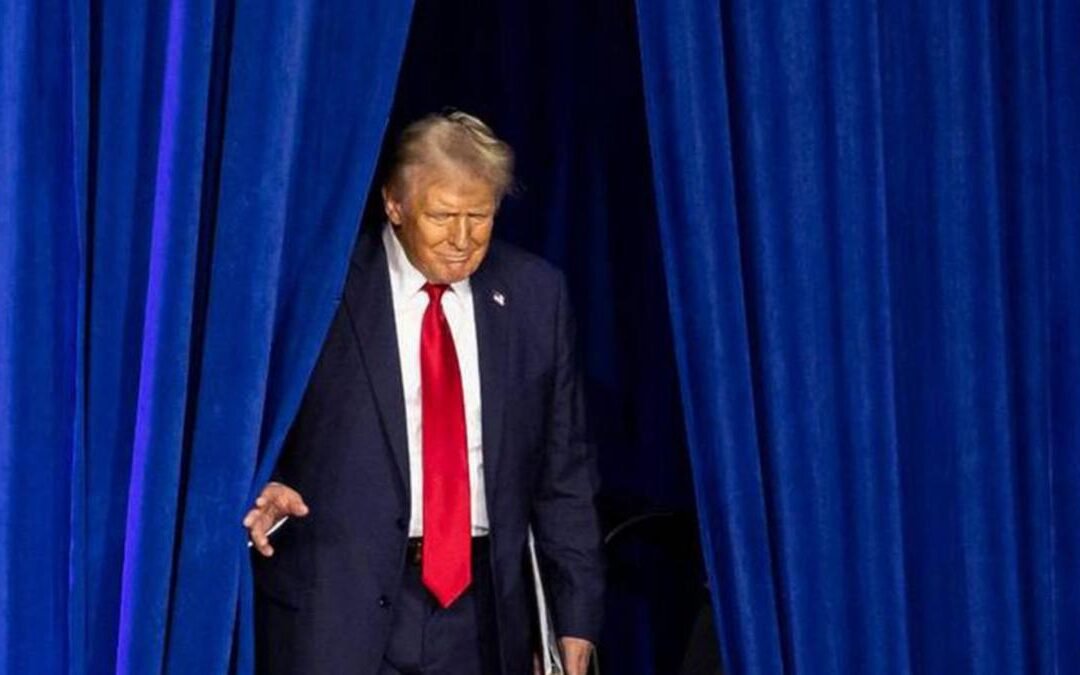President-elect Donald Trump’s recent threat to impose 100% tariffs on BRICS nations if they move toward creating a shared currency or challenging the US dollar’s supremacy is an alarming reliance on economic coercion. Framed as a defensive strategy to protect American economic dominance, this approach risks destabilizing global economic systems while accelerating the very developments it seeks to prevent. By targeting a coalition of diverse economies with sweeping tariffs, Trump’s move is a profound miscalculation of geopolitical dynamics and a shortsighted understanding of the interconnected nature of today’s global economy.
The BRICS bloc—comprising Brazil, Russia, India, China, and South Africa, and now expanded to include countries such as Iran and the UAE—represents a significant portion of the global population and economic output. These nations are not just passive players in the international system but emerging powers seeking to reshape the global order to reflect multipolarity. Their exploration of a shared currency is not solely an act of defiance against the US dollar but also a pragmatic response to growing economic uncertainties and the weaponization of financial systems. Trump’s tariff threats, instead of dissuading these efforts, are likely to solidify their resolve and amplify calls for economic autonomy from Western influence
The BRICS bloc—comprising Brazil, Russia, India, China, and South Africa, and now expanded to include countries such as Iran and the UAE—represents a significant portion of the global population and economic output. These nations are not just passive players in the international system but emerging powers seeking to reshape the global order to reflect multipolarity. Their exploration of a shared currency is not solely an act of defiance against the US dollar but also a pragmatic response to growing economic uncertainties and the weaponization of financial systems. Trump’s tariff threats, instead of dissuading these efforts, are likely to solidify their resolve and amplify calls for economic autonomy from Western influence

The economic rationale behind Trump’s threats rests on the assumption that the dollar’s dominance is absolute and can be enforced through retaliatory measures. However, the strength of the dollar has historically been tied to trust in US financial institutions, the stability of the American economy, and the liquidity of its markets. Imposing severe tariffs on BRICS nations does little to address these underlying factors. Instead, it risks undermining global confidence in the US as a reliable economic partner. Such measures send a signal that trade relations with the US are contingent on political alignment rather than mutual benefit, incentivizing countries to seek alternatives.
The proposed tariffs also expose vulnerabilities within the US economy. BRICS nations are key suppliers of critical goods and raw materials, from Brazil’s agricultural exports to Russia’s energy supplies and China’s manufactured products. A 100% tariff would disrupt these supply chains, driving up costs for American consumers and businesses. The agricultural and manufacturing sectors in the US, which depend on exports to BRICS markets, would face retaliatory measures that could erode their competitiveness. This economic backlash would disproportionately affect lower-income households, compounding the inflationary pressures already straining American consumers.
Trump’s approach risks accelerating the fragmentation of the global economic order. BRICS nations, despite their internal differences, share a common interest in reducing dependency on Western-dominated systems. Tariffs of such magnitude would likely push these countries closer together, fostering stronger economic and political alliances. Initiatives like China’s Belt and Road or India’s regional trade agreements could gain momentum as BRICS nations seek to insulate themselves from US economic pressure. By alienating these emerging powers, the US risks losing its ability to shape global norms and influence key regions.
The proposed tariffs also expose vulnerabilities within the US economy. BRICS nations are key suppliers of critical goods and raw materials, from Brazil’s agricultural exports to Russia’s energy supplies and China’s manufactured products. A 100% tariff would disrupt these supply chains, driving up costs for American consumers and businesses. The agricultural and manufacturing sectors in the US, which depend on exports to BRICS markets, would face retaliatory measures that could erode their competitiveness. This economic backlash would disproportionately affect lower-income households, compounding the inflationary pressures already straining American consumers.
Trump’s approach risks accelerating the fragmentation of the global economic order. BRICS nations, despite their internal differences, share a common interest in reducing dependency on Western-dominated systems. Tariffs of such magnitude would likely push these countries closer together, fostering stronger economic and political alliances. Initiatives like China’s Belt and Road or India’s regional trade agreements could gain momentum as BRICS nations seek to insulate themselves from US economic pressure. By alienating these emerging powers, the US risks losing its ability to shape global norms and influence key regions.
El «concepto dual» que Rusia utiliza en el Ártico
Los vientos fríos alcanzan un promedio de 50 km/h. La temperatura puede llegar a -50° Celsius; donde el suelo en gran parte se encuentra congelado (permafrost). En un territorio de estas...
The inclusion of nations like India and Brazil in this punitive framework is a significant flaw in Trump’s strategy. Both countries have historically maintained strong ties with the West while balancing their roles within BRICS. Targeting them with harsh tariffs could weaken their alignment with the US and encourage deeper engagement with non-Western blocs. This would represent a significant strategic loss for the US, as India and Brazil have often acted as moderating voices within BRICS, advocating for dialogue over confrontation. Trump’s tariffs risk tipping this balance, consolidating anti-Western sentiment within the bloc.
One of the most significant consequences of these tariffs is the potential erosion of trust in multilateral institutions like the World Trade Organization (WTO). The WTO’s framework, already under strain from years of neglect and unilateral actions, faces further challenges when major economies resort to such sweeping measures. This undermines the principle of rules-based trade and sets a precedent for other nations to bypass established norms in favor of unilateral actions. The result is a fragmented trade landscape where smaller economies bear the brunt of diminished cooperation and rising protectionism.
At the domestic level, Trump’s tariff threats may appeal to segments of the electorate that favor economic nationalism. However, their implementation could yield counterproductive results. The higher costs of goods and potential job losses in export-dependent industries would likely offset any short-term political gains. Furthermore, the long-term impact on US credibility and influence in global trade would far outweigh the immediate benefits of appeasing protectionist sentiment.
A more effective approach would recognize the legitimate concerns driving BRICS nations’ initiatives and address them through constructive engagement. Rather than resorting to punitive tariffs, the US could work to strengthen multilateral institutions, promote transparency in global financial systems, and collaborate with BRICS countries on shared challenges such as climate change and technology standards. By demonstrating a willingness to engage on equal terms, the US could maintain its leadership role while fostering stability and inclusivity in the global economic order.
.
By Phd. Muhammad Asif Noor
Founder of Friends of BRI Forum, Senior Advisor to Pakistan Research Centre at Hebei Normal University in China, Co-Founder of the Alliance of China-Pakistan Research Centres, and Senior Fellow at the Centre for CPEC Studies at Kashi University in China.
One of the most significant consequences of these tariffs is the potential erosion of trust in multilateral institutions like the World Trade Organization (WTO). The WTO’s framework, already under strain from years of neglect and unilateral actions, faces further challenges when major economies resort to such sweeping measures. This undermines the principle of rules-based trade and sets a precedent for other nations to bypass established norms in favor of unilateral actions. The result is a fragmented trade landscape where smaller economies bear the brunt of diminished cooperation and rising protectionism.
At the domestic level, Trump’s tariff threats may appeal to segments of the electorate that favor economic nationalism. However, their implementation could yield counterproductive results. The higher costs of goods and potential job losses in export-dependent industries would likely offset any short-term political gains. Furthermore, the long-term impact on US credibility and influence in global trade would far outweigh the immediate benefits of appeasing protectionist sentiment.
A more effective approach would recognize the legitimate concerns driving BRICS nations’ initiatives and address them through constructive engagement. Rather than resorting to punitive tariffs, the US could work to strengthen multilateral institutions, promote transparency in global financial systems, and collaborate with BRICS countries on shared challenges such as climate change and technology standards. By demonstrating a willingness to engage on equal terms, the US could maintain its leadership role while fostering stability and inclusivity in the global economic order.
.
By Phd. Muhammad Asif Noor
Founder of Friends of BRI Forum, Senior Advisor to Pakistan Research Centre at Hebei Normal University in China, Co-Founder of the Alliance of China-Pakistan Research Centres, and Senior Fellow at the Centre for CPEC Studies at Kashi University in China.








